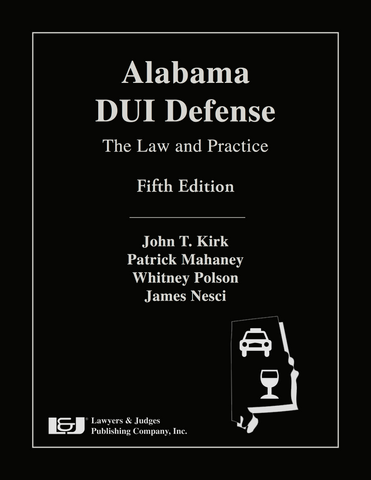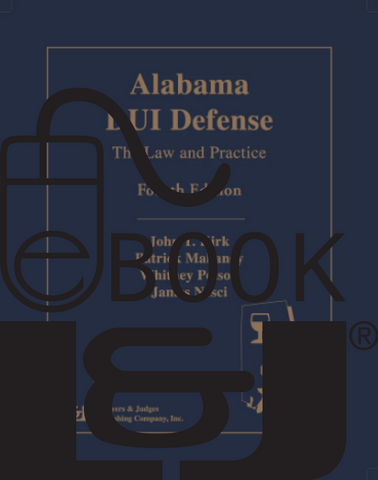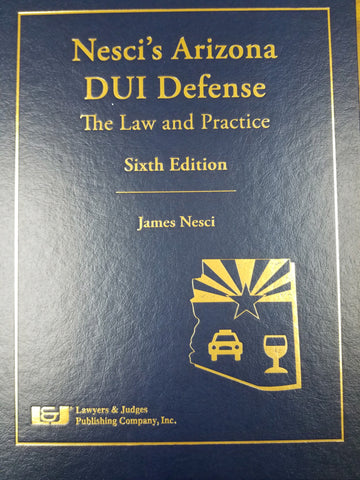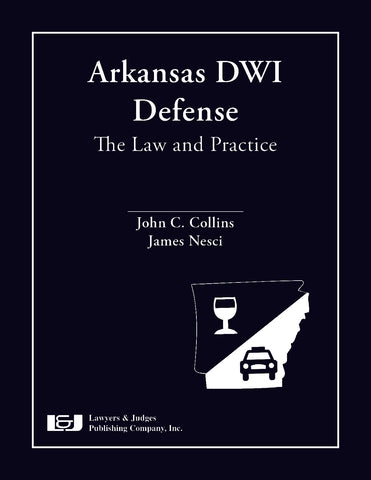
West Virginia DUI Defense: The Law and Practice PDF eBook
- Authors: Harley O. Wagner & James Nesci
- ISBN-10: 1-933264-36-5
- ISBN-13: 978-1-933264-36-3
- Copyright Date Ed: June 1, 2010
- Pages: 260
- PDF eBook
For even the most seasoned attorney admitted to practice in the State of West Virginia, defending DUI cases has always presented special challenges. Today mounting a successful defense is more difficult than ever. Now you have the advantage with West Virginia DUI Defense: The Law and Practice. This text contains the most important information to help you attain a successful verdict.
Written by Harley O. Wagner and James Nesci, both members of the National College for DUI Defense, West Virginia DUI Defense: The Law and Practice ensures that you understand the chemical, biological and technological concepts and issues underlying DUI prosecution and defense in the State of West Virginia. The authors provide the most up-to-date information available on key areas of DUI law in West Virginia including: DUI Investigations, Driving and Field Sobriety Testing, Drug Recognition, Evaluation and Chemical Testing, Blood Alcohol Calculations, Pre-trial Investigations and Motions, Practice, Plea Offers and Agreements, DUI Trial Procedures, and more.
Lawyers & Judges has published twenty state-specific DUI defense reference books. A practitioner in Colorado raved in the Colorado Lawyer that Colorado DUI Defense: The Law and Practice is “a must-have resource” and would make “a nice gift for the lawyers in your life who practice DUI defense.” The Wisconsin Lawyer reviewer gave Wisconsin OWI Defense: The Law and Practice a touchdown review, calling the book “the best book I have read pertaining to Wisconsin operating-while-intoxicated (OWI) law, and one of the best in dealing with the substance of OWI law.”
Book Topics Include:
- Types of DUI
- Role of the Motor Vehicle Division
- Pre-trial investigation
- DWI investigations
- Driving behavior
- Field sobriety testing
- Drug recognition
- Chemical testing for alcohol and drugs
- Blood alcohol calculations
- Use of expert witnesses
- Pre-trial motions
- Plea offers
- Revised sentencing charts
- DUI jury trial information
- Client relations
- Ethics and advertising
- West Virginia Rules of Evidence
- Notices of proposed rulemaking
DVD topics include:
- USDOT "Drugs That Impair Driving" student manual and teacher manual
- USDOT "DWI Detection and Standardized Field Sobriety Testing" student manual and teacher manual
- SFST validation studies
- USDOT "SFST Refresher Training Course" student manual and teacher manual
- West Virginia rules and regulations
- MVD court abstracts
- NHTSA "The Detection of DWI Motorcyclists" brochure
- NHTSA "Use of Sobriety Checkpoints for DUI" article
- NHTSA driving and blood alcohol concentration studies
- NHTSA visual detection videos
- And more!
Table of Contents
Table of Cases
How to Use This Book
Foreword
Chapter 1: Lawyer Advertising
1.1 Ethical Issues
1.2 Advertising Resources
Chapter 2: Client Relations
2.1 Meeting the Prospective Client
2.2 Retainer Agreements
2.3 Fees
2.4 IOLTA
2.5 Communication
2.6 Client Interview
Chapter 3: Driving Under the Influence
3.1 Manner of Charging DUI: WV Code 17C-5-2
3.2 Types of Misdemeanor DUI Charges: WV Code 17C-5-2
3.3 Misdemeanor DUI Penalties: WV Code 17C-5-2
3.4 Types of Felony DUI Charges—WV Code 17C-5-2
3.5 Felony DUI Penalties—17C-5-2
3.6 Negligent Homicide—17C-5-1
3.7 Reckless Driving—17C-5-3
3.8 Driving on a License Revoked for DUI and/or Administrative Non-DUI Suspension—WV Code 17B-4-3
Chapter 4: Department of Motor Vehicles
4.1 Overview
4.2 Implied Consent Laws
4.3 The Implied Consent Form
4.4 Order of Revocation: Notice
4.5 Penalties
4.6 Reduction of Suspension
4.7 The Interlock Program / "The Blow Tube"
4.8 Prior Suspension / Prior "Blow Tube" Participation
4.9 When to Enroll in License Reinstatement Course
4.10 Hearing Request Form
4.11 Search for Record of Prior Offenses by Driver
4.12 Right to Attorney Prior to Taking Chemical Test
4.13 DMV Appeals
4.14 Expungement of Motor Vehicle Record
4.15 Driving on a License Suspended or Revoked for DUI—WV Code 17B-4-3(c)
Chapter 5: Pre-Trial Investigations
5.1 Overview
5.2 Visiting the Scene
5.3 Photography and Videos
5.4 Diagrams and Aerial Photography
5.5 Pre-trial/DMV Proceedings
Chapter 6: Pre-Trial Motions Practice
6.1 Overview
6.2 Procedural Motions
6.3 Substantive Motions
6.4 Motions in Limine
6.5 Pre-Trial Motion Hearings
Chapter 7: Plea Offers
7.1 Overview
7.2 Waiver of Rights
7.3 Guilty versus No Contest: How Should My Client Plead?
7.4 Collateral Consequences
7.5 Exposure of Prior Offenses
7.6 Immigration Consequences
7.7 Misdemeanor Plea Offers
7.8 Felony Plea Offers
Chapter 8: Trial
8.1 Overview
8.2 Voir Dire and Jury Selection
8.3 Jury Instructions
8.4 Opening Statements
8.5 Cross-Examination
8.6 Direct Examination
8.7 Closing Argument
8.8 Sentencing
Chapter 9: DUI Investigations: Driving and Field Sobriety Testing
9.1 Overview: National Highway Traffic Safety Administration (NHTSA)
9.2 Driving Behavior
9.3 Standardized Field Sobriety Testing (SFST) Validation Studies
9.4 Legal Analysis and Summary of the SFST Validation Studies
9.5 Standardized Field Sobriety Test Battery
9.6 Horizontal Gaze Nystagmus (HGN)
9.7 One-Leg-Stand
9.8 Refusal of SFSTs and General Admissibility
9.9 Commonly Used Non-Standardized/Validated Field Sobriety Tests
9.10 Videotaping the Driving and Investigation
Chapter 10: Drug Recognition Evaluation
10.1 Overview
10.2 DRE Law
10.3 The 12-Step DRE Protocol
10.4 Deconstruction and Analysis of the 12-Step DRE Protocol
10.5 Effects of Various Drugs
10.6 Drug Evaluation Classification Protocol (DECP)
Chapter 11: Chemical Testing
11.1 Preliminary Breath Testing
11.2 Law on PBT
11.3 Safeguards
11.4 Commonly Used PBT Devices
11.5 Henry’s Law and the Blood to breath Ratio
11.6 Evidential Breath Testing
11.7 Principles and Theory of Dry Gas Standards
11.8 Gas Tank Instrument Errors
11.9 Principles of Fuel Cell Sensor
11.10 Principles of Infrared Cell
11.11 General Operating Principles
11.12 Interferents
11.13 The Operating Environment
11.14 Intoximeter EC/IR-II Card
11.15 Evidential Test Errors
11.16 Warning Messages
11.17 Maintenance
11.18 Breath Testing: Methods of Attack
11.19 Federal Requirements for Evidential Breath Testers (EBT)
11.20 Calibration Standard with Dry-Gas
11.21 Statutory Requirements for Admissibility of Breath Test Results
11.22 Blood Testing: From the Vein to the Lab
11.23 Headspace Gas Chromatography
11.24 Statutory Requirements for Admissibility of Blood Test Results / WV Code 17C-5-6
Chapter 12: Blood Alcohol Calculations for Attorneys
12.1 Blood Alcohol Calculations for Attorneys
12.2 Determining the One-Drink Potential
12.3 Elimination and Retrograde Extrapolation
12.4 White’s Retrograde Extrapolation
Chapter 13: Expert Witnesses
13.1 Pre-trial Preparation
13.2 Direct Examination of the Defense Expert Witness
13.3 Cross of the State’s Expert Witness
13.4 Direct Examination of the State’s Expert as a Defense Witness
Chapter 14: DUI Jury Trial Warpack
14.1 Actual Physical Control
14.2 Administrative License Hearing
14.3 Appellate Standard of Review
14.4 Arrest
14.5 Blood Draws
14.6 Confrontation and Cross Examination
14.7 Destruction of Evidence
14.8 Double Jeopardy
14.9 DRE: Drug Recognition Evaluation Admissibility
14.10 Enhancements
14.11 Evidence
14.12 Jury Selection
14.13 Miranda
14.14 Reasonable Suspicion
14.15 Roadblocks (a.k.a. "DUI Checkpoints")
14.16 Searches
14.17 Voluntariness of Statements
Appendix A: West Virginia Rules of Evidence
Appendix B: West Virginia Rules of Criminal Procedure
Appendix C: West Virginia Bureau for Public Health Regulations
Appendix D: Code of State Rules
Appendix E: DUI—Modern Day Salem Witch Hunts
Appendix F: The Aging Process and Field Sobriety Tests




